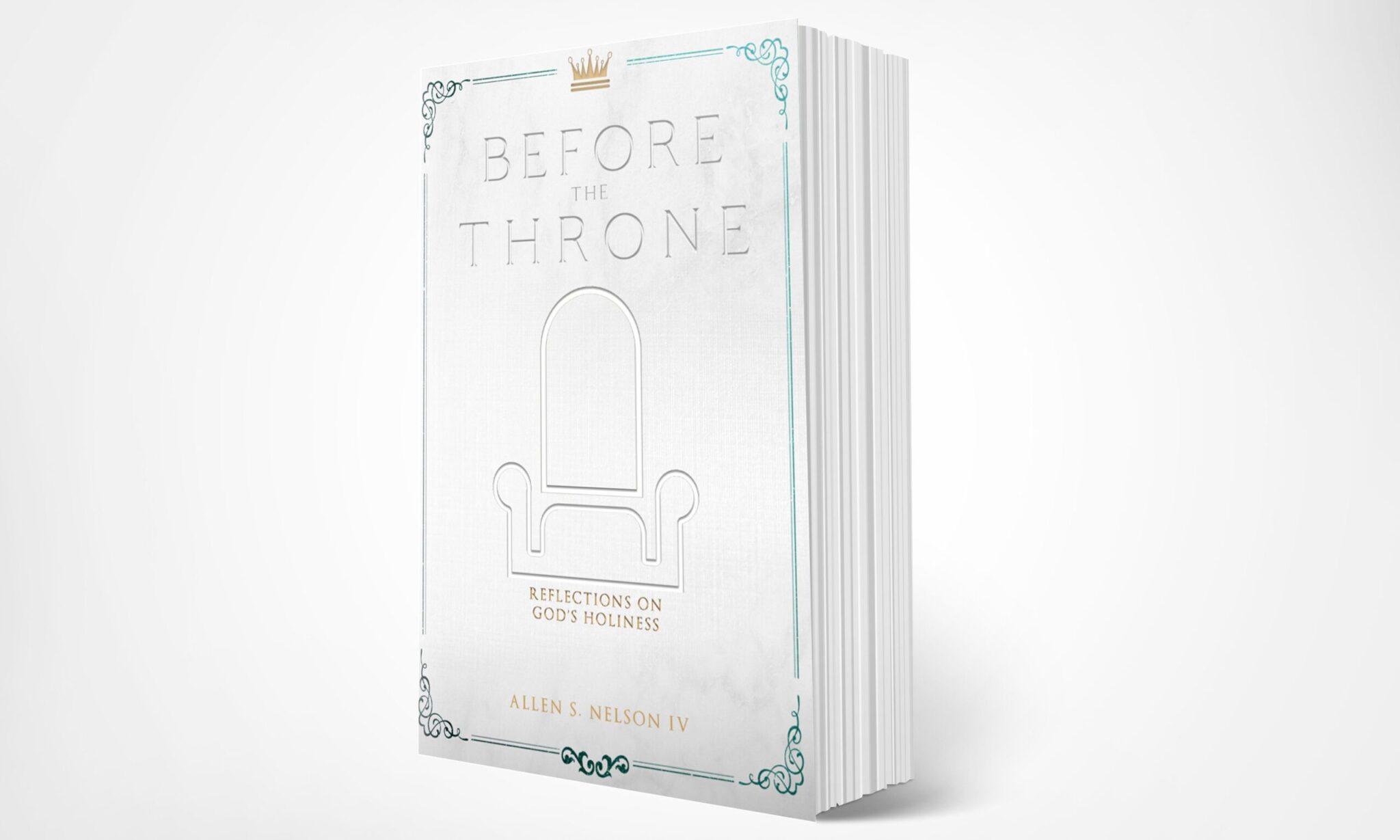Sale Info.
Beginning today my second book, Before the Throne: Reflections on God’s Holiness is on sale (read endorsements here – or read a review here, here, or here).
The Amazon Kindle edition is just $0.99! Beginning 10/28/19 the paperback copy will be just $11.99 on Amazon. However, for ThingsAbove readers, I’m offering the special sale price of $10.31 (in honor of Reformation Day!). This price includes shipping. So, for basically the price of half a Starbucks, you can snag my book 😉
This offer is good from 10/25/19 — 11/4/19. All I ask is that you subscribe to ThingsAbove via email (click here). Then, fill out this Google Form and I’ll be in touch. If you want more than 1 copy you can indicate that in the form (price will be reduced per copy).
In the meantime, enjoy the Introduction to the book, I hope it whets your appetite for more! (If you’d like to read the Introduction in pdf, click here)
 Introduction
Introduction
Nothing else is more decisively consequential in your life than understanding God rightly. Knowing God changes everything.
The task before us, therefore, is of critical importance. In twelve short chapters, we seek to grasp a better understanding of who God really is. Dr. Albert Mohler writes, “If we begin with a wrong conception of God, we will misconstrue the entirety of the Christian faith.”[1] No pressure, but the entirety of the Christian faith is at stake here.
The journey we embark upon would be fruitless, or worse, counterproductive —leading us to think wrong thoughts about God—if we did not have God’s self-revelation accessible to us.
Thankfully, we do have God’s Word readily available, and it is to this Word we turn time and again in this book. Without that Book, the book you now hold in your hands would be useless.
But it’s not enough to merely have the Bible in front of us. We need to actually believe it in order for it to benefit our lives. Otherwise, the Scriptures only serve to condemn us for our hard-heartedness. Mohler goes on to say, “If we can reject God as he has revealed himself in Scripture, then we can and will reject everything else.”[2]
So, how exactly does God reveal Himself in Scripture? There are several good ways to answer this question, but there is one word we can use to sum it all up. Holy.
This book primarily uses two passages from Scripture to help us wrap our minds around what the Bible means (thus, what God means) when the word holy is used to describe the Lord. These passages of Scripture are from Isaiah 6:1-7 and Revelation 4:5-11.
It will be beneficial, therefore, for us to review these passages now before we proceed to Chapter 1.[3] We’ll start by looking at Isaiah 6:1-7.
Isaiah 6:1-7
In the year that King Uzziah died I saw the Lord sitting upon a throne, high and lifted up; and the train of his robe filled the temple. Above him stood the seraphim. Each had six wings: with two he covered his face, and with two he covered his feet, and with two he flew. And one called to another and said, “Holy, holy, holy is the Lord of hosts;
the whole earth is full of his glory!”And the foundations of the thresholds shook at the voice of him who called, and the house was filled with smoke. And I said, “Woe is me! For I am lost; for I am a man of unclean lips, and I dwell in the midst of a people of unclean lips; for my eyes have seen the King, the Lord of hosts!”
Then one of the seraphim flew to me, having in his hand a burning coal that he had taken with tongs from the altar. And he touched my mouth and said: “Behold, this has touched your lips; your guilt is taken away, and your sin atoned for.”
This vision, occurring some 740 years before the birth of Christ, serves as Isaiah’s “call to the ministry.” Here he recounts his summons as a prophet of the living God. The focal point of this encounter with God is Isaiah’s experience of God’s holiness as he recounts the seraphim calling one to another, “holy, holy, holy is the Lord of hosts.”
This revelation of the holiness of God and the subsequent grace of forgiveness completely transformed Isaiah from someone who only thought he understood the Lord of hosts to a prophet willing to relentlessly proclaim, “Thus saith the Lord” in the midst of a hostile and obstinate people. Encountering a God of infinite holiness radically impacted him forever.[4]
The presence of God has that effect on people. We can experience God this way, too. No, we won’t have a vision or dream or extra-biblical revelation. But in His Word, we can see God as He has revealed Himself.
To properly interpret this Word, we need the Holy Spirit to enable our understanding, but we also must put some effort into our study, employing the means He has given us:
- Spending diligent time reading and studying the Bible
- Serious meditation upon what we read
- Prayer for understanding His truths
- Commitment to the local church
In this way, we are able to make it our lifelong endeavor to discover every facet of God’s holiness that He revealed to us in His Word. And as we regularly reflect on God’s holiness, we seek to live lives commensurate with such an encounter. We can do this because of His marvelous grace. Let it be our lasting endeavor to leave no nook or cranny of God’s holiness unexplored and let this quest consistently deepen our awe of who He is.
John’s Vision
Now that we’ve briefly explored Isaiah’s vision, we fast forward to the last book of the Bible to explore the parallel experience of the Apostle John in Revelation 4:5-11.
This passage occurs around A.D. 95, during John’s exile on the island of Patmos.[5] Nearly 850 years after Isaiah’s vision, John has one of important similarity. Let’s examine the passage in its entirety now.
Revelation 4:5-11
From the throne came flashes of lightning, and rumblings and peals of thunder, and before the throne were burning seven torches of fire, which are the seven spirits of God, and before the throne there was as it were a sea of glass, like crystal. And around the throne, on each side of the throne, are four living creatures, full of eyes in front and behind: the first living creature like a lion, the second living creature like an ox, the third living creature with the face of a man, and the fourth living creature like an eagle in flight.
And the four living creatures, each of them with six wings, are full of eyes all around and within, and day and night they never cease to say, “Holy, holy, holy, is the Lord God Almighty, who was and is and is to come!”
And whenever the living creatures give glory and honor and thanks to him who is seated on the throne, who lives forever and ever, the twenty-four elders fall down before him who is seated on the throne and worship him who lives forever and ever. They cast their crowns before the throne, saying, “Worthy are you, our Lord and God, to receive glory and honor and power, for you created all things, and by your will they existed and were created.”
Though differences certainly exist between Isaiah’s and John’s visions, the one truth that transcends time and binds these passages together is the reality of a holy God seated upon His throne. However one might interpret the book of Revelation, none of us can escape the fact that the One seated upon the throne is eternally “holy, holy, holy.”
In my effort to make these brief introductory notes about these passages, I must confess how difficult it is not to burst forth in exultation as we consider the glory of these wonderful texts—and more importantly, the glory of the One they describe. God is vastly more glorious than we can ever fully imagine. What a difficult yet praiseworthy task we have before us. It will be worth the effort.
The remainder of this book is designed to reflect upon the passages above as they pertain to the boundless treasure of God’s holiness. We sit together (and perhaps fall on our faces) before the throne of God seeking to meditate upon the vastness of the concept that God is thrice holy. What exactly does that mean? How should that impact our walk before almighty God?
The following chapters each conclude with questions and verses you can use personally, in group discussion, or in your home with your spouse and children. The questions and parallel passages are designed to fuel praiseworthy thoughts and conversations about our holy God.
These questions are by no means exhaustive. In fact, I hope they will motivate you to broaden your discussion of each chapter. I encourage you to explore the passages listed underneath the questions, as well. Discuss these verses with your children, small group, Sunday school class, or simply ruminate in them yourself as you gaze upon our holy God.
The holiness of God stretches infinitely beyond the puny effort many give to contemplating it –if they even meditate on God at all. May this not be true of us! The energy we expend in knowing Him more fully must be proportionate to His glorious excellencies. He is so much greater than we can fully fathom.
Therefore, it is my prayer that you will have a few “woe is me” and “worthy are You” moments as you reflect upon the very character of the triune God. His holiness permeates all His attributes in such a way that nothing of God can be properly understood apart from the qualifier, “holy.”
His love, grace, justice, mercy, righteousness, and wrath are all holy. His plans, purposes, and promises are all holy. Everything about our glorious God is holy, holy, holy. And the goal for His people is holiness.
Read with this in mind. May our reflections upon the holiness of God lead us upon a wonderful journey of worship and strengthen our commitment to personal holiness.
*For the special sale price of $10.31, all I ask is that you subscribe to ThingsAbove via email. Then, fill out this Google Form and I’ll be in touch. If you want more than 1 copy you can indicate that in the form (price will be reduced per copy).
[1] R. Albert Mohler, Jr. The Apostles’ Creed: Discovering Authentic Christianity in an Age of Counterfeit, (Nashville: Nelson Books, 2019), 3.
[2] Ibid.
[3] Thank you, Dale Wilson, for encouraging me to write an introduction overviewing these texts.
[4] We do not know exactly how Isaiah died. Some traditions claim he was sawn in two by King Manasseh. But though we are not certain how his life ended, we are confident of how his life as a prophet of God began and that is what is important here. Isaiah 6 describes that beginning.
[5] Patmos is in the Aegean Sea off the west coast of modern-day Turkey.





